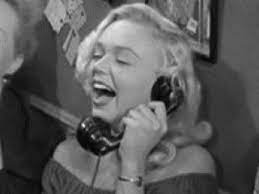One of the smallest talking parts in Billy Wilder’s Sunset Boulevard (1950), goes to a giggling girl (played by Yvette Vickers) who is found laughing on the phone at the party Joe attended when he was fleeing Norma Desmond’s control. The ‘Giggling Girl’ is only given roughly a minute of screentime, and because of this, is exceptionally easy to overlook. Sunset Boulevard (1950) is a classic noir film, with tension constantly rising as the viewers are focused on Joe Gillis, as he tries to escape a horrific fate. As a struggling writer, he ends up stumbling upon silent film star, Norma Desmond, who is desperate to return to stardom and acting. Joe is forced into helping Norma achieve this dream again, which begins the twisting story of manipulation, death, and greed.
Within this story, the Giggling Girl only poses as another obstacle in the protagonist’s way. However, the Giggling Girl is a crucial part to why this film works, and why this film can continue to grow such intense tensions. Films like Sunset Boulevard (1950) need minor characters to pose, as Will Shaw states in his Introduction to The Small Parts, Small Players Dossier, a “…social everydayness that might significantly challenge the gendered character of these narratives and the worlds in which they unfold…” (para. 4). It comes to no one’s surprise that, at a large party with young adults drinking, there is a girl messing around and laughing with a friend. She fully ignores Joe’s urgent requests to use the phone, not even noticing Joe’s annoyance or need, too immersed in her fun with her friend. The scene itself is very humanizing because, while, yes, frustrating from Joe’s perspective, is very real to what could potentially be observed in reality.
This is what minor characters do; they give a sense of ‘realness’ and ground the film’s world into our reality (Shaw, para. 4–5). The Giggling Girl also becomes another barrier later, for Joe and Betty, interrupting them before they kiss. Once again, she’s completely oblivious to what is going on around her, innocently telling Joe that the phone is ready now. This allows the romantic tension between Joe and Betty to continue to grow. This is what makes her so wonderful! Viewers do not need to know more about her, because that is not her purpose. She is only there to briefly complicate and push the plot along; so, the viewers can continue to be submerged into the growing tensions. All films run on a limited time, and too much knowledge and focus on so many characters loses all of that feeling the film is trying to create. This is why extremely minor characters, even without a name, are still so important to storytelling as a whole.
Work Cited
Straw, Will. “Introduction.” Screen, vol. 52, no. 1, 2011, pp. 78–81, https://doi.org/10.1093/screen/hjq057.
Sunset Boulevard. Directed by Billy Wilder, Paramount Pictures, 1950.

Provide Feedback